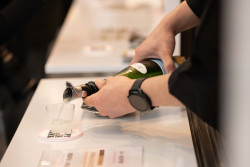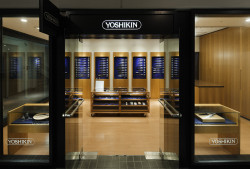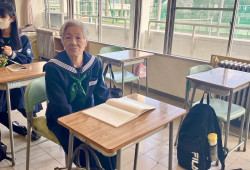
Originally published on metropolis.co.jp on April 2014

In a city that never sleeps—though often naps on trains and desks—the residents all need some form of release. Thankfully, there are a few opportunities healthier than the usual over-indulging in happy hours or occasionally jabbing inattentive passers-by with your umbrella. The Tony Evans & deVere Group Executive Fight Night is one of the more extreme options. It affords office workers—bothJapanese and non-Japanese alike—the chance to step into an authentic Vegas-style boxing ring for three 2-minute rounds and physically beat the stress out of each other like dust from an old futon.
The event organizers, Eddie Nixon, Dave Thomas and Nathan Schmid, refer to themselves collectively as the “Ginja Ninjas” and talk of a dark winter’s night in a Harajuku back street when the idea for EFN came to them. It proved an instant success, and went on to sell out on all three occasions, raising a total of ¥17 million for charity. The first event supported Run for the Cure, whose aim is to eradicate breast cancer as a life-threatening disease in Japan through education, timely screening and treatment; and the last two raised money for Refugees International Japan, an NPO that assists refugees displaced by war and conflict around the world. This time, for EFN IV: Fists of Fury, proceeds will go to the Shine On! Kids’ facility dog program, which provides animal-assisted therapy to children with cancer. The organization’s marketing manager, Joy Fajardo, has intimate knowledge of EFN, having fought in—and won—the very first bout in November 2012.
THE CONTENDERS

The current crop of fighters comprises sixteen men and women from ten different countries, all of whom have been put through a rigorous 12-week boot camp at Club 360 run by professional coaches and former professional fighters Jan Kaszuba and Ona Davaa. Only carefully selected applicants make it through to the boot camp, and the Ginja Ninjas are unequivocal that preparation for the main event is a fight within itself. “It is certainly not for the faint hearted,” Nixon says. “You hit and get hit hard. Blood is spilled. You train very early in the morning or late into the night while juggling your job, family and other commitments.”
Those chosen to compete must attend a minimum of 24 sessions regardless of any other commitments they have. One of the organizers even arranged for Herman Douglas, an engineer from Jamaica, to attend a local boxing gym while on a 2-week business trip in New York, giving him an opportunity to learn from career boxers. “They had a calm serenity out of the ring,” Douglas says. “And a collected and calculated switch into their all-too-familiar fight mode when they stepped in to spar. I’ll do my best to draw from those lessons when I get in the ring.”
As well as improvement in boxing technique, many of those competing have undergone rapid physical transformations during the twelve-week boot camp. Filip Pusnik, a financial coordinator from Wales, lost 6kg during the process due to the intensity of the regimen and a strict diet that almost completely cuts out carbohydrates. Project director Sam Yusef had to lose—then regain—4kg due to his original (lighter) opponent pulling out.







